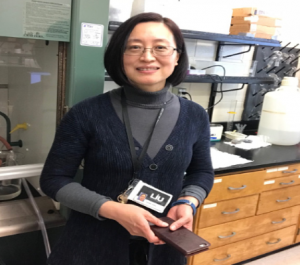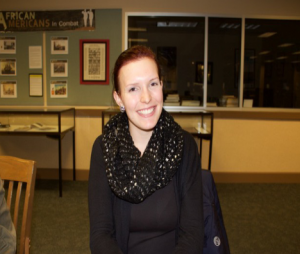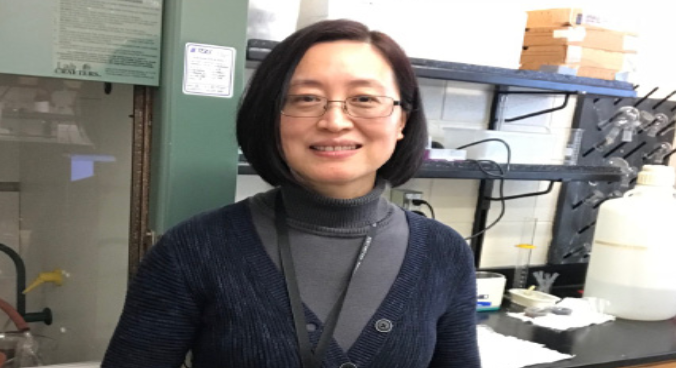By Angelique D’Alessandro
Assistant Online Editor
The 120-credit bachelor of science in forensic science degree in the department of chemistry, according to the LIU Post website, prepares students for rewarding careers “in the laboratory departments of police departments, medical examiners’ offices, toxicology and pathology.” The program integrates lecture courses with laboratory work and hands-on field experiences.

Dr. Cheng Zhang, professor of chemistry
Yet, some students in the program, have voiced concerns about the laboratory equipment available to them.
Jamie Licausi is a senior forensic science major, only months away from her graduation. She has studied the subject she is most passionate about for four years, attending classes, interning, and preparing to eventually enter the workforce as a forensic scientist.
There’s only one problem – Licausi feels that Post has not provided her with the education she paid for. “In the laboratories, a lot of the time we don’t have instruments that work,” Licausi said. According to Licausi, her professor had to cancel a class meeting one day due to not having the equipment to carry out an experiment.
The class was supposed to use a particular instrument necessary to see what chemical was in a sample, but that day the few instruments that were available to the students were unusable, outdated and easily breakable.
Licausi said that at first, her education at Post seemed to be satisfactory. It wasn’t until she interned at the Westchester County Forensics Lab that she realized she did not have the tools she needed for the workplace. “At an internship, they expect you to have used these instruments before,” Licausi said, “and I hadn’t been given that experience [at Post].”
In addition to this, Licausi, who had originally planned to double major in forensic science and chemistry, discussed the recent end to the B.S. in chemistry degree. Students can still get a B.A. in chemistry, but according to Licausi, this is a less science-based degree.
Dr. Cheng Zhang, professor of chemistry, agrees that the lack of a B.S. in chemistry degree has affected students. “We want to have a bachelor of science [in chemistry] because it is more focused on science,” Zhang said. “We no longer offer it, and that has affected some students.” Zhang also agrees that there is a need for new instruments for the students working with her on her research project in her lab. “We have instruments on campus- some are good, but some are very old. We would love to have funding to purchase more instruments for the program.” According to Zhang, the students in the chemistry department still thrive without the instruments, but their dedication is the exact reason they need the opportunity to work with more tools. “My students do great work. Students from the program went to Washington D.C. to present their work and two won national awards. Only 100 in the nation win this,” Zhang said. “I hope that people will see that we need these instruments for our research.”

Jamie Licausi, senior forensic science major
Neil Edwards, the chemistry department laboratory manager, also expressed disappointment with the end of the B.S. in chemistry degree. “I think we lost a few chemistry majors because of it,” Edwards said. “Traditionally, if you want to go to grad school, you get a bachelor of science degree. I don’t understand the decision, but it is not in my hands.”
Edwards said that updates have been made in the chemistry department, but that the biomedical department is in more need of updated equipment. “In biomedical, things like the gene analyzers are outdated and need to be replaced,” Edwards said. “I think the equipment [in chemistry] does the job it is supposed to do. I hope to see updates in the next few years, but it is not as needed right now in the chemistry department as it is for genetic equipment.”
Edwards said the last set of updates to the laboratories in the chemistry department took place five years ago. “All of the labs received updated fume hoods, which are an integral part of the lab in terms of safety,” Edwards said. Within the last four years the department also added two new research laboratories, he said.
Cece Amayo, a senior biomedical science major, said that her education has been affected by the lack of instruments available to science majors.
“In chemistry, we have equipment that is outdated. The lab set up is outdated, too. Most other labs [at other universities] have better instruments,” Amayo said.
“At Post, money isn’t going into science. We are not getting the education we pay for,” Amayo said. “It doesn’t look good for the university.”
Dr. Vladimir Fainzilberg, a chemistry professor, agreed that the program needs equipment updates. “We need an update of practically all equipment, especially in forensic science. The equipment in that program is outdated,” Fainzilberg said. “In chemistry, we have good mass spectrometers, and very good FTIR, used in organic chemistry analysis. But we badly need an update on gas chromatographers.”
Although the department has requested funding for updated instruments, Fainzilberg said the “cries remain in vain.” Fainzilberg said, though, that “compared to other departments in the college of arts and sciences, we must treat ourselves as a “lucky” department. Administration was kind enough to update our general chemistry labs about five years ago, and we are now considered as state-of-the-art for entry-level chemistry courses, even compared to Ivy League universities.”
Fainzilberg added that the administration “also has the intention, which still only remains an intention, to update the organic chemistry laboratories this coming summer. But, we are still short on equipment and especially short on full-time staff, which ultimately hurts our students and affects the quality of education.”
For Licausi and Amayo, both seniors, a change in the curriculum and updated laboratory instruments would be a good start.
“I would like to see the money go where it is really needed. We are the next generation of doctors and nurses. Money should go to student education,” Amayo said.
Licausi also hopes that by speaking up about the issues within her program, she can make her voice heard and inspire change on campus.
“I want to make our program the best it can be,” Licausi said. “And I want to be able to be proud when I say I graduated with a forensic science degree from Post.”







Be First to Comment